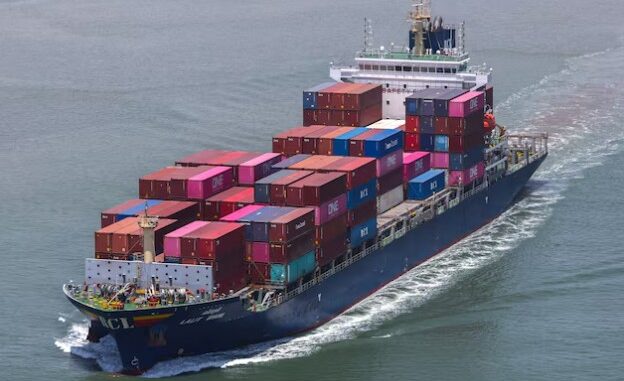
In a bold move that underscores growing tensions over global environmental regulations, the United States has reportedly urged other nations to oppose a proposed United Nations deal aimed at curbing emissions from marine fuels, threatening tariffs, visa restrictions, and port levies against those who support it. This development, revealed by sources familiar with the matter, highlights the Trump administration’s strategy to leverage economic pressure in reshaping international shipping policies that could inflate costs without delivering meaningful climate benefits.The International Maritime Organization (IMO), the UN agency overseeing global shipping, drafted the so-called “Net-Zero Framework” in April 2025. This agreement seeks to impose fees on ships that exceed carbon emissions standards, with the goal of accelerating decarbonization in an industry responsible for about 3% of global CO2 emissions and 90% of world trade.
Are you Paying High Taxes in New Jersey, New York, or California?
The US withdrew from the talks that same month and escalated its opposition in August, arguing that the framework would burden the shipping sector disproportionately. By late summer, the State Department began contacting IMO member states directly, warning of retaliatory measures if the deal advances at an extraordinary session in October 2025.
Countries like the Netherlands have already received verbal warnings, with threats of tariffs looming if they back the proposal.
This US stance comes amid broader criticism of the IMO’s overarching 2023 Greenhouse Gas (GHG) Strategy for shipping, which many view as an example of bureaucratic overreach. Adopted in July 2023, the strategy sets ambitious targets: reducing the carbon intensity of international shipping by at least 40% by 2030 compared to 2008 levels, striving for 20-30% absolute GHG reductions by 2030, 70-80% by 2040, and net-zero emissions by or around 2050.
It builds on the 2018 Initial Strategy but ramps up the pressure with tools like a GHG Fuel Standard (GFS), mandatory emissions limits, and carbon pricing mechanisms.
Proponents claim these measures will phase out fossil fuels in shipping, but critics argue they represent an unelected body’s intrusion into sovereign economic affairs, forcing compliance through penalties that could disrupt global supply chains.The overreach is particularly evident in the strategy’s global scope. With 176 member states, the IMO’s mandates apply universally, yet they often ignore the economic disparities between developed and developing nations. For instance, carbon pricing—such as levies on high-emission fuels—could generate revenue for green transitions, but much of it risks being funneled into bureaucratic programs rather than tangible innovations.
This one-size-fits-all approach overlooks how shipping routes and fleet compositions vary, potentially penalizing emerging markets that rely on older, cheaper vessels. The US’s threats signal a pushback against what some see as the UN’s pattern of imposing costly regulations without adequate input from major economic powers.Beyond the geopolitical friction, the real sting lies in the economic fallout. Implementing the IMO’s GHG Strategy is projected to hike shipping costs significantly, with ripple effects on global trade and consumer goods. Carbon taxes or fees could increase transport expenses by altering fuel choices and routes, leading to higher freight rates.
For example, switching to zero-emission fuels like hydrogen or synthetics might cut emissions by 80-100%, but at a steep price: these alternatives are far more expensive to produce and distribute, potentially adding billions in annual costs to the industry.
A 2024 UN Trade and Development report noted that rerouting ships to comply with emissions rules—such as avoiding high-emission zones—has already boosted fuel, insurance, and chartering costs, with emissions paradoxically rising in some cases due to longer voyages.
These burdens get passed down: importers face elevated prices for everything from electronics to food, inflating global inflation without proportional environmental payoffs.

Critics contend that these costs come without substantial gains in lowered emissions. While the strategy aims for net-zero by 2050, its intermediate targets—such as 30% reductions by 2030—rely on unproven technologies and face implementation hurdles.
Shipping’s emissions might decrease marginally through efficiency tweaks, but global trade growth could offset these gains, with projections showing emissions potentially rising without revolutionary breakthroughs.
Moreover, the strategy’s focus on carbon intensity (emissions per transport work) allows absolute emissions to creep up if trade volumes expand, undermining claims of “decarbonization.”
Environmental benefits, like reduced ocean acidification or air pollution co-benefits, are touted, but studies suggest the net impact on global CO2 levels will be minimal given shipping’s small share of total emissions.
This scenario echoes recent corporate retreats from green initiatives, such as Shell’s decision to scrap a major biofuels plant in Rotterdam. In September 2025, the energy giant announced it would not restart construction on the facility, citing insufficient competitiveness and high costs—despite initial plans to produce sustainable aviation fuel (SAF) that could reduce lifecycle emissions by up to 80%.
SAF, derived from bio-oils or waste, costs 30% more than fossil jet fuel in best-case scenarios, with other pathways even pricier due to feedstock and processing expenses.
Shell’s pullout, which could result in a $600 million to $1 billion hit, underscores a harsh reality: these “sustainable” options often fail to deliver real environmental advantages at scale, burdened by economic impracticality and lack of uniform incentives like carbon pricing.
Just as Shell deemed biofuels unviable, the IMO’s push for low-emission ship fuels risks imposing similar inefficiencies on a global fleet, driving up costs for dubious gains.
As the October IMO vote approaches, the US’s tariff threats could sway outcomes, potentially derailing the Net-Zero Framework and prompting a reevaluation of how environmental goals align with economic realities. For energy stakeholders, this saga serves as a reminder: ambitious mandates must prove their worth, or risk being rejected as overreaching burdens on the backbone of global commerce.
Avoid Paying Taxes in 2025
Crude Oil, LNG, Jet Fuel price quote
ENB Top News
ENB
Energy Dashboard
ENB Podcast
ENB Substack







